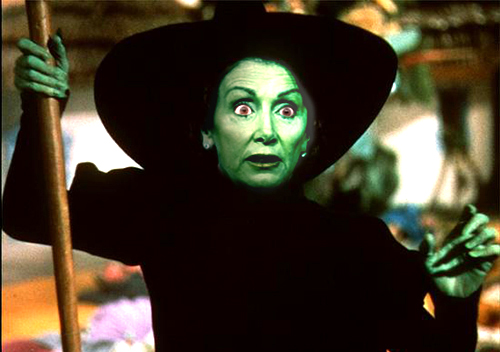Today, Roll Call reported that Rep. Nancy Pelosi has appeared with her and her husband’s investment partner and her son’s former boss, investment banker Bill Hambrecht, three times at Capitol Hill economic policy forums as an “economic expert” over the last four years without disclosing their financial relationship. None of this is illegal, and none of it would be prevented by the so-called STOCK (Stop Trading On Congressional Knowledge) Act currently gathering steam in Congress.
But as Breitbart editor Peter Schweizer reports in his bestselling book, Throw Them All Out, the Pelosi-Hambrecht alliance runs far deeper and spans as far back as the early 1970s.
Paul and Nancy Pelosi have invested millions with Mr. Hambrecht, and Mr. Hambrecht has invested millions in Democratic Party campaigns and causes–over $2 million, to be exact, at least $38,000 of which went directly to Rep. Pelosi. Indeed, according to Mr. Hambrecht, Nancy Pelosi was the catalyst that ignited his passion for donating money to Democrats. According to a 2006 article published in the San Francisco Chronicle, Mr. Hambrecht “said he never contributed to politics until he was inspired by Pelosi after meeting her in the early 1970s.”
Since the formation of their relationship, the Pelosis have made numerous investments in Hambrecht-related companies, including a $12 million investment in Hambrecht’s United Football League that appears to have floundered. In a 2009 Washington Post article, Paul Pelosi addressed whether his investments or career as a real estate investor presented any potential conflicts of interest for his wife’s role in Congress.
“Let me put it this way,” he added. “I think I have a good radar in terms of what kind of business investments would be inappropriate for me given her position. And I can’t think of an investment I discussed with her and said, ‘Is this a good idea or is it a problem?’ Back in the day when she first went into government and I was in real estate, I never did anything with resolution trust — there were tremendous opportunities there to go buy things and make a lot of dough. I never did because I thought if I did and I made dough that there would be something they would obviously criticize her for.
“So I’ve religiously steered away from anything that would look controversial to her position. My radar tells me there is no problem with this. If there is, I will deal with it.”
As Roll Call notes, one investment that didn’t flop was the one between $5 million and $25 million (members of Congress only have to report ranges of investment, not actual figures) the Pelosis made in a Hambrecht-related investment firm named Matthews International Capital Management. That investment produced between $100,000 to $1 million of income for the Pelosis just last year.
Mr. Hambrecht’s forays into congressional matters extend beyond just the economic forums that he participated in with Rep. Pelosi. On July 19, 2001, Nancy Pelosi honored William Hambrecht from the floor of the United States House of Representatives with a speech lauding him and “acknowledging his contributions and on-going dedication to social justice and the advancement of the Bay Area’s well-being. I applaud his commitment to his community and cherish his friendship,” said. Rep. Pelosi from the House floor.
In December of 2010, William Hambrecht, whom many consider a pioneer in the field of Initial Public Offerings (IPOs), appeared before the House Finance Committee, chaired by Barney Frank, a Pelosi ally, to push for a change in the registration process for stock IPOs, an exemption called Regulation A. In Throw Them All Out, Peter Schweizer reports that “Hambrecht wanted the exemption raised to $30 million, which would greatly benefit his business, making IPOs easier, quicker, and far less expensive.” Washington Examiner reporter Tim Carney called the timing of the hearing “odd” and quoted Rep. Barney Frank as saying that Rep. Nancy Pelosi had been the inspiration for the hearing:
Chairman Barney Frank called a hearing of the committee to discuss new rules for initial public offerings. The timing was odd: It coincided with meetings of the Republican caucus and the Democratic Steering and Policy Committee. As a result, Rep. Frank stepped out of the hearing early on…”I should note also that it was Speaker Pelosi,” Frank said at the beginning of Tuesday’s hearing, “who first called this to our attention earlier in the year.” Frank went on: “It is something that the speaker has taken a great interest in because of her interest in job creation, so we have had to find a way to have this hearing.”
Later in the article, Carney added:
So why would the Financial Services Committee hustle to hold this hearing despite so many other more pressing issues? Maybe because Nancy Pelosi’s friend, donor and business partner wanted it.
Pelosi’s office didn’t return a phone call, but Hambrecht did. I asked him if his ties to Pelosi earned him the hearing. He said Pelosi was motivated only by “genuine desire to find a private-sector solution” to unemployment. Hambrecht added that Democratic Rep. Anna Eshoo, whose Silicon Valley district includes many start-ups, was the real prime mover.
Rep. Nancy Pelosi’s office continues to defend her longstanding financial alliance with Mr. William Hambrecht, and none of her actions appear to have violated House Ethics rules or would be prevented even if the STOCK Act passes.
Still, Rep. Pelosi’s financial and personal relationship with Mr. William Hambrecht further underscores the need to clarify the appropriate relationship between business interests and elected officials, as well as the STOCK Act’s apparent deficiencies.

COMMENTS
Please let us know if you're having issues with commenting.